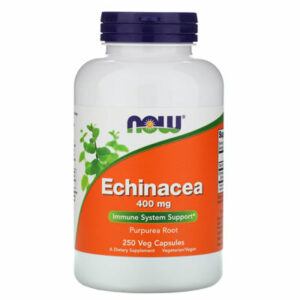Echinacea was the most popular medicinal herb in North America for hundreds of years before the emergence of antibiotics. It was mainly used to fight infections and was even thought to cure all diseases in the early days.
Do you know the benefits of echinacea supplement?
Table of Contents
- What is Echinacea?
- What are the benefits recommended by Echinacea?
- Are there any side effects of Echinacea?
- Safety precautions
- The best time to use Echinacea
- Where to buy the most recommended Echinacea health products?
What is Echinacea?
Echinacea is a perennial medicinal plant belonging to the Asteraceae family. It is rich in polysaccharides, glycoproteins, alkyl amides, volatile oils, flavonoids, and other ingredients. It has potential effects of anti-inflammatory and immune regulation.
Today, Echinacea is mainly used to improve cold and flu-related symptoms, and it is also one of the few medicinal plants approved by the German Government Organization (Commission E) and the World Health Organization.
What are the benefits recommended by Echinacea?
1. Common cold
Cold is a common self-limiting upper respiratory tract virus infection disease, and the annual direct medical costs and indirect economic losses associated with it are as high as tens of billions of dollars.
There are more than 200 kinds of cold viruses, rhinovirus and coronavirus are the most common. It usually takes 2 to 3 days of the incubation period to show complete symptoms. Discomforts such as sore throat, runny nose, headache, cough, and fever.
The biggest difference between colds and flu is that in addition to the virus strain, the biggest difference is that the flu comes quickly and fiercely. High fever of more than 38, muscle, and joint pain are the most common symptoms.
A meta-analysis of literature (including 14 studies, 2986 participants) pointed out that the use of Echinacea preparation can reduce the average cold event by 58% and the number of days of cold duration of 1.4 days.
A Cochrane Review (contained 24 double-blind clinical trials, 4631 participants) pointed out that Echinacea may have a slight effect of reducing cold events, but no significant effect on the duration of colds.
*Conclusion: Oral Echinacea may have the effect of reducing common cold events and reducing the number of days of onset, but it is limited by the heterogeneity between the studies and needs to be verified by more accurate research studies.
2. Reduce recurrent respiratory infections and complications
Respiratory tract infections are the most common diseases of children, the elderly, and immune dysfunction. Generally speaking, serious infections more than 6 times a year can be defined as recurrent respiratory tract infections.
In addition to the host’s immunity, recurrent or persistent respiratory tract infections, nutritional deficiencies, environmental pollution, stress, and lack of sleep may increase the infection rate and the occurrence of complications.
A meta-analysis of literature (including 6 clinical studies, 2458 participants) pointed out that the use of Echinacea extract can help reduce the risk of recurrent respiratory infections by 35% on average, especially tincture products (referred to as ethanol extraction). The effect is most significant.
The same analysis also pointed out that the prevention effect of Echinacea is the most significant for the population under stress, immune disorders, and high risk of disease, with nearly 50% prevention effect.
In addition, related complications such as pneumonia, otitis media, otitis media, tonsillitis/pharyngitis are also rare.
3. Beneficial autoimmune uveitis
Uveitis usually refers to inflammation of the pigmented layer of the eyeball (iris, ciliary body, and choroid), which is one of the main causes of severe visual impairment and also accounts for 10-15% of total blindness.
Uveitis can be divided into infection and non-infectious factors, while autoimmune uveitis is mainly caused by non-infectious factors.
80% of cases of autoimmune uveitis are idiopathic (the cause of the disease is unknown), and the remaining 20% are related to systemic diseases, such as sarcoidosis and Behcet’s disease, Hart’s syndrome (Vogt–Koyanagi–Harada syndrome), lupus erythematosus, rheumatoid arthritis, etc.
A preliminary controlled study (9 months, 51 patients with mild autoimmune uveitis) pointed out that compared with the control group receiving only steroids, the combination of Echinacea, in addition, to help reduce the use of steroids, the most Jiajia also improved vision.
*Conclusion: Echinacea may help control the progress of autoimmune uveitis, but more experiments are still needed to confirm it.
Are there any side effects of Echinacea?
For most people, the proper use of Echinacea as recommended is very safe, but the reported side effects include gastrointestinal upset, fever, nausea, tongue numbness, dizziness, insomnia, joint and muscle pain, vomiting, diarrhea, sore throat, Dry mouth.
Safety Precautions
1. People who have been allergic to Asteraceae (ragweed, chrysanthemum, calendula, or daisy), and those with asthma or allergies, please be careful. The use of Echinacea may induce allergic reactions, from mild rashes to systemic allergic reactions. possible.
2. Do not use the following symptoms (because the relevant safety is unknown), such as tuberculosis, HIV carriers or AIDS, diabetes, connective tissue diseases, multiple sclerosis, leukemia, (blood cancer) and any autoimmune diseases.
3. Do not use for pregnant women, nursing mothers, children under 12 years old, and those with poor liver and kidney function (because the relevant safety is unknown).
4. Do not use immunosuppressive drugs (because it may affect the effectiveness of the drug).
5. Do not use in combination with caffeinated drinks or related preparations, because Echinacea may slow down the rate of caffeine metabolism and increase side effects related to caffeine overdoses, such as jitteriness, headache, and rapid heartbeat.
6. Do not use with drugs that need to be metabolized by cytochrome p450 enzymes, it may cause drug efficacy or cause adverse reactions. Common drugs such as lovastatin, clarithromycin, cyclosporine, diltiazem, indinavir, triazolam, clozapine, cyclobenzaprine, fluvoxamine, haloperidol, imipramine, mexiletine, Olanzapine, pentazocine, propranolol, tacrine, theophylline, zolmitriptan.
The best time to use Echinacea
Echinacea can improve immunity and increase human anti-viral ability in a short time. Therefore, unlike general health foods that need to be taken for a long time, they should be used in “necessary situations”. The so-called necessary situations are divided into the following two.
When you have cold symptoms such as headache, stuffy nose, runny nose, and sore throat.
In an environment that may be infected (for example, in a public place or in contact with a cold patient).
Because all clinical reports indicate that Echinacea can exert a greater healing effect in the early stage of a cold, but if it is dragged for too long, the infection symptoms are very serious, and the effect is not obvious.
Echinacea’s recommended dosage
Generally speaking, in the early days of colds, you need to take 3 times a day, each dose is: 300 mg lozenges, 2 to 3 ml drops, the general cold only need to be taken continuously for 5 to 7 days, if it has been taken continuously For more than 2 weeks, please stop at least one week and renew the service to achieve the best results.
Where to buy the most recommended Echinacea health products?
In recent years, food safety problems in various countries have exploded, and it is not healthy but black-hearted products that everyone spends on. Therefore, European and American products with relatively strict quality control have become popular products.
And iHerb.com is a large-scale medical cosmetics e-commerce company in the United States. It has a high satisfaction rate of 97% in the evaluation of Google customers. It provides global home delivery so that you can buy it without risking buying fakes through purchasing high-quality health products.

